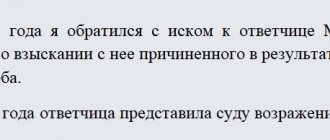Legal consultation > Administrative law > Rights of the defendant in civil proceedings: from A to Z
Are you going to participate as a defendant in court? Then you just need to know your rights and your responsibilities as a defendant in court, and also be familiar with other points related to this process:
- become familiar with your legal status;
- documents submitted to the court by the defendant;
- articles on the obligations of the defendant;
- articles on the rights of the defendant.
If you are interested in these questions, then you have come to the right place and this page definitely contains important information for you.
General information
The defendant is the entity against whom the plaintiff filed claims in court. The legal status of this person is briefly disclosed in Article 35 of the Code of Civil Procedure. However, there are other legal norms that establish its procedural status.
Simply put, the defendant is the entity who, according to the plaintiff, must perform a certain duty.
In practice, persons whose rights have been violated file claims for a variety of reasons. The subject of the dispute may be a property right, a monetary or non-monetary obligation.
The Code of Criminal Procedure uses the concept of “civil defendant”. As a rule, this person is the person guilty of the crime. Accordingly, the plaintiff in such cases is the victim. A civil defendant may also be an entity that is financially responsible for the criminal actions of the accused.
For the court, the defendant is not always a person who knowingly breaks the law. According to the presumption of innocence, it is the plaintiff who must prove the validity of the claims.
In civil proceedings, the defendants are usually individuals. However, municipal/state bodies represented by their representatives can also participate in the dispute.
Trial
A trial is a process that takes place in a courtroom and involves three parties: the court, the plaintiff and the defendant. The court process resolves the dispute between opposing parties. The court considers the plaintiff’s claim, and the defendant must either accept this claim or prove his non-involvement. The plaintiff must present all available evidence of the defendant's guilt before him. The latter, in turn, must provide evidence of his innocence. Whose arguments will outweigh in this fight, the truth will be on the other side. Final verdicts are made by the court, whose representative is the judge. If the proceedings are too complex, either party may seek the assistance of a lawyer.
Important point
The person to whom the demands are made is not obliged to refute them. However, this is extremely important for resolving the case in his favor.
The law provides for the right of the defendant to file an objection to the claim. Lawyers do not recommend neglecting it. The fact is that if the objection is not raised, the court will have more grounds to consider the plaintiff’s arguments justified.
Defendant's motions
Refuting the plaintiff's arguments can be done in various ways. One of the means of proof is a petition. It expresses a request from a party to the dispute to perform some action.
So, the defendant can, for example, file a petition for:
- appointment of examination;
- calling witnesses;
- adjournment of hearing;
- granting a deferment/installment plan for execution of the decision;
- attracting co-defendants;
- recognizing the evidence presented by the plaintiff as inadmissible, etc.
Petitions can be made both in writing and orally. In the latter case, the defendant's request is recorded in the minutes of the meeting. Lawyers, however, recommend that petitions be made in writing in advance, if possible.
Counterclaim
One of the most important tools for protecting a defendant is the ability to file counterclaims against the plaintiff.
It is advisable to bring such a claim if:
- A counterclaim is aimed at offsetting the original claim.
- There is a mutual connection between the stated claims, and their simultaneous consideration will reduce the time of the proceedings.
- Satisfaction of counterclaims excludes satisfaction of the original claims in full or in a certain part.
The defendant's counterclaim may be filed before the court leaves to make a decision on the merits.
Additionally
The defendant, according to the law, has the right to get acquainted with the materials of the proceedings, make extracts and copies. At the same time, he is allowed to use video and photographic equipment.
In case of disagreement with the court decision, he has the right to appeal it in appeal, cassation or private proceedings.
If a settlement agreement has been concluded between the parties, which to a greater extent satisfies the interests of the defendant, he can claim compensation for the legal costs incurred by him. A similar possibility is provided in case of partial/complete dissatisfaction of the plaintiff’s demands.
Replacing the second side
The judge, having accepted the claim, may see that the wrong person has been chosen as the second party. There is a choice of an inappropriate defendant in civil proceedings.
It is up to the plaintiff to decide whether to agree or not to the court’s proposal to involve another defendant. The judge does not have the right to make independent decisions in this regard. On the other hand, he may leave the claim without progress, indicating the need to provide a set of documents for another defendant and, in connection with this, adjust the requirements of the claim. The plaintiff is forced to correct the text of the claim, indicating an additional defendant and attaching an additional set of copies of documents.
The result of the claim in such a situation is a decision to satisfy it in relation to some of the defendants.
Co-defendants
One of the tasks in preparing for trial is to identify a specific person (individual or legal) against whom the plaintiff is making his claims. In this case, there may be several defendants in the case.
The number of co-defendants depends on various circumstances: what kind of right is infringed, how the plaintiff intends to restore it, whether a claim for compensation for losses has been made, etc.
Proceedings involving all persons who, in the opinion of the applicant, have violated his rights, can significantly reduce the time of consideration of the case, as well as save money. If claims against different persons arise from the same legal relationship, it is advisable to combine them in one application.
As for the defendant, attracting other persons to your side will reduce legal costs, distribute procedural responsibilities, and increase the volume of the evidence base.
What to take with you to participate in the hearing and defend in court
The closer the date of the hearing, the more closely you need to work with documents and evidence. By the way, according to the Code of Civil Procedure of the Russian Federation, the maximum period for consideration of a case cannot exceed 2 months, and for magistrates - 30 days. Over the past 5-7 years, courts have been quite clearly observing these procedural deadlines. If necessary, the case can be suspended, which entails an interruption of the trial period. If the specified deadlines are slightly exceeded, you will not be able to gain anything from such a situation. If the court delays the process without good reason, you can file private complaints about red tape or contact the departments for ensuring legal proceedings.
To avoid any problems with admission to court and participation in the process, you need to have with you:
- a valid passport of a citizen of the Russian Federation (it will be checked at least twice - when entering the courthouse, at the beginning of the hearing);
- the child's birth certificate or decision to appoint a guardian (if you represent the interests of a minor or incapacitated defendant);
- copies of the statement of claim and all materials received at the stage of assigning the case;
- determination of the court indicating the case number and date of the hearing (it will make it easier to pass the control of the bailiffs at the entrance to the court and find the courtroom);
- documents that you have collected or prepared for the meeting - evidence, requests, petitions, reviews, counter-calculations, etc.
It is advisable to take with you only the truly necessary documents on which you will base your defense. Even if the plaintiff has submitted to the court piles of documents that are indirectly related to the case, it is better to write out or make copies only of the necessary fragments than to get confused in mountains of papers at the hearing.
If your interests are represented by a lawyer, he will also prepare documents. However, I recommend having with you the same set of documentation that the representative will have. With the help of a lawyer, you can highlight important fragments on copies in advance and make the necessary notes. All documents at the hearing must be in front of your eyes, since the court will not wait for a long search for the required form.
You cannot take prohibited substances and objects, weapons, or drugs with you to court. The bailiff has the right to ask you to present personal belongings for inspection and to go through a metal detector. Refusal of such a requirement will most likely result in claims from the bailiff, and you will not get to the meeting.
How to cope with anxiety before trial
This is a very difficult question that even an experienced psychologist cannot answer. Usually lawyers are no less worried about the process than the client himself. I do not recommend using sedatives or other drugs, as this may affect your behavior in the meeting. Here are a number of recommendations that will help alleviate a stressful situation:
- brainstorm the day before the meeting - use the tactics of students or schoolchildren before exams, read only the most important fragments from the case materials, organize this information in your head;
- do not try to imagine in advance how the process will go - it is almost impossible to assess the options for the development of events, and you will only lose your nerves;
- come to court at least an hour before the trial - many of my clients immediately became calmer when they saw the usual business bustle in the building and corridors of the court;
- do not enter into debates or altercations with other participants in the case before the meeting - this is pointless and will only escalate the situation;
- do not succumb to the provocations of the plaintiff, who will probably want to unbalance you - the more confident you feel, the worse the moral state of the plaintiff will be.
A separate question is how a child should behave in court. For young children, mandatory attendance at hearings is rare. Also in this case, teachers or psychologists are involved. If you are the child's legal representative in court, explain that participation in the case does not entail any consequences for him. Even if a child refuses to answer the court’s questions, they cannot force or punish him.
Let's move on to the most important point of this article - how to behave in court immediately after the hearing begins. To do this, we will determine what rights and obligations are assigned to the defendant by law.
Find out more When will courts start working after quarantine?
Mandatory participation of co-defendants
The legislation establishes the ability of the court to involve other persons in the proceedings if it is difficult to make an objective decision without them or it provides for obligations for subjects not participating in the case.
If relevant circumstances are identified during the dispute proceedings, after the involvement of co-defendants, it will begin again.
Bibliography
- Civil Procedure Code of the Russian Federation of November 14, 2002 No. 138-FZ: adopted by the State. Duma Feder. Collection Ross. Federation October 23, 2002; approved Federation Council Feder. Collection Ross. Federation October 30, 2002; input Feder. Russian law Federation of November 14, 2002 No. 137-FZ; in ed. Feder. Law of December 19 2021 No. 438-FZ // Collection. Russian legislation Federation. 2002. No. 46, art. 4532; 2021. N 52 (Part V), art. 7487.
- Treushnikova M.K. Civil procedure: Textbook (5th edition, revised and expanded) / Ed. M.K. Treushnikova. - M.: “Statute”, 2014.-464 p.
- Vaskovsky E.V. Civil procedure course: Subjects and objects of the process, procedural relations and actions. // – M.: “Statute”, 2016.-624 p.
Protection against claims
As stated above, the burden of proving the validity of the claims rests with the plaintiff. Accordingly, the defendant’s defense against claims often comes down to their denial.
A more effective way is to file an objection/response to the claim. In it, the defendant sets out his vision of the situation and supports his arguments with evidence.
If there are grounds, a counterclaim may be filed. Its preparation is no different from the preparation of the initial requirements. In this case, the defendant acquires all the procedural obligations and rights of the plaintiff.
Often during the proceedings, defendants resort to so-called tricks. For example, the subject may challenge the judge, ask to postpone the hearing or to carry out an examination, or demand that this or that evidence be recognized as irrelevant to the case. It must be said that all these requests and demands must be justified. Otherwise, the court may regard them as an abuse of law aimed at delaying the proceedings.
If the plaintiff's demands are justified, it is advisable to agree with them. This will not only speed up the process of considering the case and making a decision on it, but also significantly reduce legal costs. If the defendant deliberately delays the proceedings, penalties may be applied to him.
Some nuances
Involvement as a civil defendant in a criminal case is impossible if the act is committed by persons whose liability is excluded for a number of reasons. For example, cases are initiated against citizens under 18 years of age only under certain articles. If criminal proceedings are excluded, the victim still has the right to file a regular claim in court.
If for some reason a civil claim was not filed and not considered in criminal proceedings, it is permitted to file a claim in civil proceedings. If the claim is rejected by the verdict, the right to it in the usual manner still remains.
If the claim was considered in the usual manner before the end of the investigation or the pronouncement of a verdict and it was refused, neither the investigator nor the judge conducting the criminal case no longer has the right to accept a civil claim.
Existing parents and guardians are involved as defendants simultaneously and without exception. That is, you cannot involve only one of the parents at your discretion.
At the same time, if the culprit has his own income, in particular, was engaged in labor or entrepreneurial activities and was even emancipated, i.e. recognized as fully capable in court, the possibility of securing the claim primarily at the expense of his property and funds is considered, and not parents or guardians.









